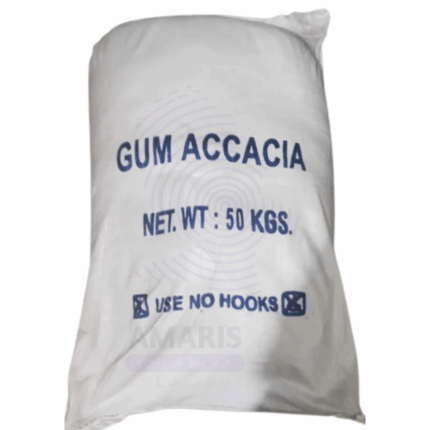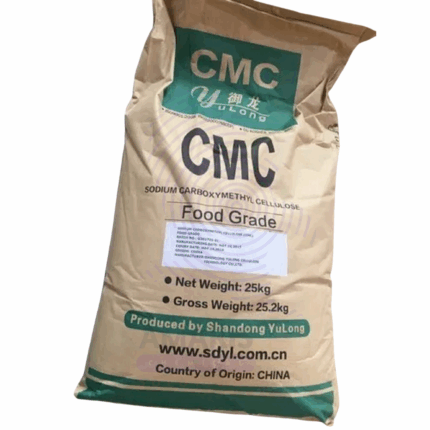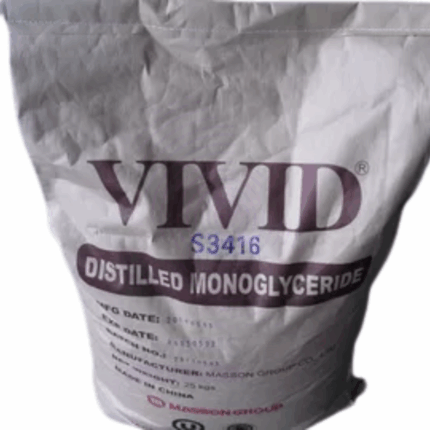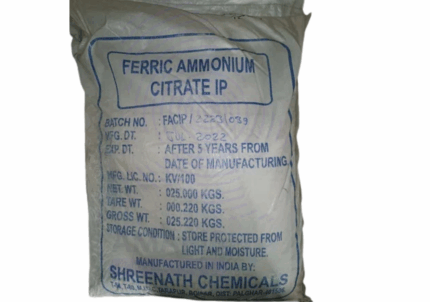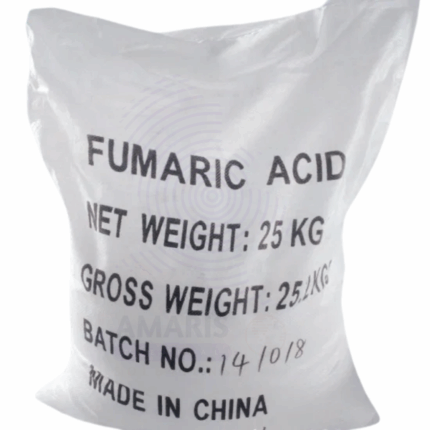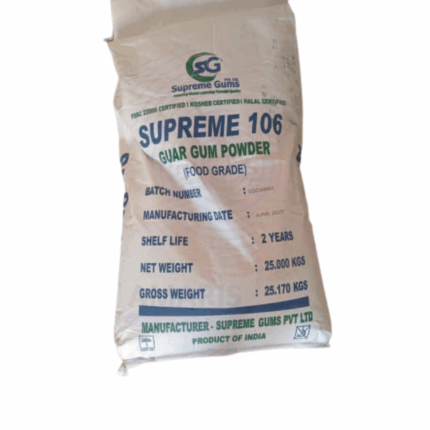
Glycerol Monostearate
$ 2.79 Original price was: $ 2.79.$ 2.67Current price is: $ 2.67.
Glycerol Monostearate Flakes
Whatsapp Order
Glycerol Monostearate Flakes is a white to off-white waxy flake form emulsifier composed of 40% monoglycerides of fatty acids, primarily stearic and palmitic acids, combined with other glycerides and esters. Derived mainly from vegetable oils, this food-grade emulsifier is widely utilized in food, cosmetic, pharmaceutical, and industrial sectors for its multifunctional properties. GMS 40% flakes serve as effective emulsifiers, stabilizers, anti-caking agents, and texture enhancers, with excellent compatibility and versatility in formulations requiring semi-solid or solid fats.
Description
Table of Contents
Toggle
Glycerol Monostearate Flakes
Primary Uses
- Food Industry
- Emulsifying agent in margarine, spreads, and shortenings to blend fats and water, improving texture and consistency.
- Acts as an anti-caking and anti-staling agent in baked goods, improving softness and extending shelf life.
- Used in ice cream and dairy products to enhance creaminess, smoothness, and melt properties.
- Functions as a stabilizer in confectionery for uniformity and improved mouthfeel.
- Utilized in chocolate and coatings to improve gloss and texture by controlling fat crystallization.
- Serves as a release agent in baking and candy manufacturing, preventing product sticking.
- Added to instant mixes and beverages to stabilize oil-water emulsions and maintain shelf stability.
- Pharmaceuticals & Nutraceuticals
- Employed as an excipient in topical creams, ointments, and gels for enhanced emulsification and texture.
- Functions as a tablet binder and dispersing agent in solid dosage forms.
- Used in nutritional supplements to aid in the uniform distribution of fat-soluble vitamins and oils.
- Cosmetics & Personal Care
- Emulsifier and thickener in creams, lotions, body butters, and hair conditioners.
- Improves skin feel and spreadability, providing a smooth and non-greasy texture.
- Acts as a stabilizer and opacifier in shampoos, liquid soaps, and sunscreen formulations.
- Enhances the water resistance and longevity of makeup and sunscreen products.
- Industrial Applications
- Used as an antistatic and lubricating agent in plastics, rubber, and packaging films.
- Functions as a processing aid and internal lubricant in polymer extrusion.
- Serves as a softening agent in textile processing and finishing.
Secondary Uses
- Agriculture
- Functions as an emulsifier in pesticide formulations to improve dispersion and efficacy.
- Used in animal feed supplements for improved mixing and stability.
- Personal Hygiene Products
- Added in deodorants, shaving creams, and cleansing bars for enhanced texture and stability.
- Paints & Coatings
- Used as a dispersing and emulsifying agent to improve consistency and finish.
KEY PRODUCT FEATURES
1. Basic Identification Attributes
- Chemical Name (IUPAC): 1-Monostearoyl-rac-glycerol
- Common/Trade Name: Glycerol Monostearate (GMS)
- CAS Number: 31566-31-1 (commercial blends)
- HS Code: 2915.90.70
- Molecular Formula: C21H42O4 (pure monostearate)
- Molecular Weight: ~358.56 g/mol
- Synonyms:
- Glyceryl monostearate
- GMS 40
- Monostearin
- E471 (food additive)
- Octadecanoic acid monoglyceride
2. Physical & Chemical Properties
- Physical State: Waxy flakes
- Color & Odor: White to off-white; faint fatty odor
- Purity: Approx. 40% monoglycerides content
- Melting Point: 55–65 °C
- Solubility:
- Insoluble in water
- Soluble in hot ethanol, oils, and fats
- pH (1% dispersion): 6–8
- HLB Value: 3.8–5.6 (oil-in-water emulsifier)
3. Safety & Hazard Attributes
- GHS Classification: Not hazardous
- NFPA Ratings: Health 0, Flammability 1, Reactivity 0
- Toxicity: Non-toxic and Generally Recognized As Safe (GRAS)
- Irritation: Mild skin or eye irritant at high concentrations
4. Storage & Handling Attributes
- Container Type: Multi-wall paper bags with polyethylene liner or fiber drums
- Storage Conditions: Store in a cool, dry, ventilated area, away from moisture and heat
- Shelf Life: Up to 24 months under recommended conditions
- Handling Notes: Avoid dust formation; keep container tightly closed
5. Regulatory & Compliance Attributes
- Food Grade: Complies with FDA GRAS, EU E471, JECFA standards
- Pharmaceutical Grade: USP/NF grades available
- REACH Registered: Yes
- Halal and Kosher: Certificates available depending on supplier
6. Environmental & Health Impact
- Biodegradability: Easily biodegradable
- Ecotoxicity: Low environmental toxicity
- Bioaccumulation: Not expected
- Carcinogenicity/Mutagenicity: No evidence of carcinogenic or mutagenic effects
SAFETY HANDLING PRECAUTIONS
Safety Handling Precautions
- PPE Required: Gloves, dust mask, safety goggles
- Handling Guidelines: Avoid inhalation of dust, avoid skin and eye contact
- Hygiene: Wash hands after handling; avoid eating or drinking during handling
First Aid Measures
- Inhalation: Move to fresh air; consult a physician if symptoms persist
- Skin Contact: Wash with soap and water
- Eye Contact: Rinse thoroughly with water for 15 minutes; seek medical advice if irritation persists
- Ingestion: Rinse mouth; seek medical attention if large quantities ingested
Firefighting Measures
- Fire Hazards: Combustible solid at high temperature
- Extinguishing Media: Water spray, foam, dry chemical, CO₂
- Combustion Products: Carbon oxides and fatty acid fumes
- Firefighter PPE: Use self-contained breathing apparatus and protective clothing
Related products
Arabic Gum
$ 6.19
Arabic Gum, also known as Gum Acacia, is a natural gum harvested from the sap of Acacia trees, primarily Acacia senegal and Acacia seyal. It is a complex mixture of polysaccharides and glycoproteins, valued for its excellent emulsifying, stabilizing, and thickening properties. Arabic Gum is water-soluble, forms clear solutions, and is widely used in the food industry as a stabilizer and emulsifier. Additionally, it finds applications in pharmaceuticals, cosmetics, and printing industries due to its biodegradability, non-toxicity, and versatility.
Carboxymethyl Cellulose Food Grade
Carboxymethyl Cellulose Food Grade is a water-soluble cellulose derivative produced by the etherification of cellulose with monochloroacetic acid. It appears as a fine, white to off-white powder with excellent thickening, stabilizing, and water retention properties. Designed specifically for food applications, this grade complies with food safety regulations and is widely used as a texture modifier, stabilizer, and emulsifier in a variety of processed foods. It enhances product consistency, extends shelf life, and improves moisture retention without altering taste or odor. Being non-toxic, biodegradable, and non-caloric, it is considered safe for human consumption and is approved as a food additive in many countries.
Distilled Monoglycerides Remosoft
Distilled Monoglycerides Remosoft are purified monoglycerides derived from the glycerolysis of edible fats and oils, followed by a distillation process that removes impurities and enhances purity. They are colorless to pale yellow, odorless, and possess excellent emulsifying properties. DMG is widely used in food, pharmaceutical, and cosmetic industries due to its surface-active properties, ability to stabilize emulsions, and function as an anti-caking and lubricating agent. The distilled grade ensures high purity and low free fatty acid content, making it suitable for sensitive applications.
Ferric Ammonium Citrate
Ferric Ammonium Citrate is a dark green to black crystalline or granular inorganic compound composed of iron, ammonium ions, and citrate ions. It is a complex salt of citric acid with ferric iron (Fe³⁺) and ammonium. This compound is highly soluble in water, forming a greenish solution, and is widely utilized as a source of iron in various chemical, pharmaceutical, photographic, and food applications. It acts as a mild oxidizing agent and an iron supplement, valued for its bioavailability and ease of incorporation into formulations. Ferric Ammonium Citrate is typically available in different formulations distinguished by their water and ammonium content, such as green and brown types.
Fumaric Acid
Fumaric Acid is a naturally occurring dicarboxylic acid characterized by its white crystalline powder form and a slightly acidic taste. It is an unsaturated organic acid with the chemical formula C4H4O4 and is an intermediate in the Krebs cycle in biological systems. Fumaric Acid is commonly found in various plants and fungi and is commercially produced by isomerization of maleic acid or by fermentation. It is widely used in the food, pharmaceutical, chemical, and polymer industries due to its acidulant, antioxidant, and crosslinking properties.
Guar Gum
Guar Gum is a natural polysaccharide extracted from the endosperm of the guar bean (Cyamopsis tetragonoloba). It appears as an off-white to cream-colored powder with a neutral odor and bland taste. Guar Gum is a galactomannan composed mainly of mannose and galactose units, known for its excellent water-binding, thickening, and stabilizing properties. It forms highly viscous solutions even at low concentrations, making it a versatile hydrocolloid used widely across food, pharmaceutical, cosmetic, oilfield, and industrial applications.
Magnesium Chloride
Magnesium Chloride is a white crystalline salt or granular solid composed of magnesium and chloride ions, commonly found as the hexahydrate form (MgCl₂·6H₂O). It is highly soluble in water, forming a clear, colorless solution with a slightly bitter saline taste. Magnesium Chloride is valued for its hygroscopic properties and is widely used across multiple industries including de-icing, chemical manufacturing, agriculture, food, pharmaceutical, and textile applications. It acts as a source of magnesium, a vital mineral for various biological and industrial processes.
Monosodium Glutamate
Monosodium Glutamate is the sodium salt of the naturally occurring amino acid glutamic acid. It appears as a white crystalline powder with a clean, savory taste known as "umami." MSG is widely used as a flavor enhancer in the food industry to intensify and balance flavors. The FCC (Food Chemicals Codex) grade indicates it meets purity and safety standards for food use.


 Preservatives(food)
Preservatives(food) Flavor Enhancers
Flavor Enhancers Acidulants
Acidulants Sweeteners
Sweeteners Antioxidants
Antioxidants Colorants(food)
Colorants(food) Nutraceutical Ingredients (food)
Nutraceutical Ingredients (food) Nutrient Supplements
Nutrient Supplements Emulsifiers
Emulsifiers
 Collectors
Collectors Dust Suppressants
Dust Suppressants Explosives and Blasting Agents
Explosives and Blasting Agents Flocculants and Coagulants
Flocculants and Coagulants Frothers
Frothers Leaching Agents
Leaching Agents pH Modifiers
pH Modifiers Precious Metal Extraction Agents
Precious Metal Extraction Agents
 Antioxidants(plastic)
Antioxidants(plastic) Colorants (Pigments, Dyes)
Colorants (Pigments, Dyes) Fillers and Reinforcements
Fillers and Reinforcements Flame Retardants
Flame Retardants Monomers
Monomers Plasticizers
Plasticizers Polymerization Initiators
Polymerization Initiators Stabilizers (UV, Heat)
Stabilizers (UV, Heat)
 Antifoaming Agents
Antifoaming Agents Chelating Agents
Chelating Agents Coagulants and Flocculants
Coagulants and Flocculants Corrosion Inhibitors
Corrosion Inhibitors Disinfectants and Biocides
Disinfectants and Biocides Oxidizing Agents
Oxidizing Agents pH Adjusters
pH Adjusters Scale Inhibitors( water)
Scale Inhibitors( water)
 Antioxidants(cosmetic)
Antioxidants(cosmetic) Emollients
Emollients Fragrances and Essential Oils
Fragrances and Essential Oils Humectants
Humectants Preservatives
Preservatives Surfactants(cosmetic)
Surfactants(cosmetic) Thickeners
Thickeners UV Filters
UV Filters
 Fertilizers
Fertilizers Soil Conditioners
Soil Conditioners Plant Growth Regulators
Plant Growth Regulators Animal Feed Additives
Animal Feed Additives Biostimulants
Biostimulants Pesticides (Herbicides, Insecticides, Fungicides)
Pesticides (Herbicides, Insecticides, Fungicides)
 Active Pharmaceutical Ingredients (APIs)
Active Pharmaceutical Ingredients (APIs) Excipients
Excipients Solvents(pharmaceutical)
Solvents(pharmaceutical) Antibiotics
Antibiotics Antiseptics and Disinfectants
Antiseptics and Disinfectants Vaccine Adjuvants
Vaccine Adjuvants Nutraceutical Ingredients (pharmaceutical)
Nutraceutical Ingredients (pharmaceutical) Analgesics & Antipyretics
Analgesics & Antipyretics
 Analytical Reagents
Analytical Reagents Solvents(lab)
Solvents(lab) Chromatography Chemicals
Chromatography Chemicals Spectroscopy Reagents
Spectroscopy Reagents microbiology-and-cell-culture-reagents
microbiology-and-cell-culture-reagents Molecular Biology Reagents
Molecular Biology Reagents Biochemical Reagents
Biochemical Reagents Inorganic and Organic Standards
Inorganic and Organic Standards Laboratory Safety Chemicals
Laboratory Safety Chemicals Specialty Laboratory Chemicals(Special Laboratory Equipment)
Specialty Laboratory Chemicals(Special Laboratory Equipment)
 Demulsifiers
Demulsifiers Hydraulic Fracturing Fluids
Hydraulic Fracturing Fluids Scale Inhibitors(oil)
Scale Inhibitors(oil) Surfactants(oil)
Surfactants(oil) Drilling Fluids
Drilling Fluids
 Dyes and Pigments
Dyes and Pigments Bleaching Agents
Bleaching Agents Softening Agents
Softening Agents Finishing Agents
Finishing Agents Antistatic Agents
Antistatic Agents
 Admixtures
Admixtures Waterproofing Agents
Waterproofing Agents Sealants and Adhesives
Sealants and Adhesives Curing Compounds
Curing Compounds Concrete Repair Chemicals
Concrete Repair Chemicals Anti-Corrosion Coatings
Anti-Corrosion Coatings
 Surfactants(cleaning)
Surfactants(cleaning) Builders
Builders Enzymes
Enzymes Solvents (Cleaning)
Solvents (Cleaning) Fragrances
Fragrances
 Electronic Chemicals
Electronic Chemicals Catalysts
Catalysts Lubricants
Lubricants Photographic Chemicals
Photographic Chemicals Refrigerants
Refrigerants Automotive chemicals
Automotive chemicals Pyrotechnic Chemicals
Pyrotechnic Chemicals
 Biodegradable Surfactants
Biodegradable Surfactants Bio-based Solvents
Bio-based Solvents Renewable Polymers
Renewable Polymers Carbon Capture Chemicals
Carbon Capture Chemicals Wastewater Treatment Chemicals
Wastewater Treatment Chemicals
 Pigments
Pigments Solvents(paint)
Solvents(paint) Specialty Coatings
Specialty Coatings Binders/Resins
Binders/Resins Additives
Additives Driers
Driers Anti-Corrosion Agents
Anti-Corrosion Agents Functional Coatings
Functional Coatings Application-Specific Coatings
Application-Specific Coatings
 Fresh Herbs
Fresh Herbs Ground Spices
Ground Spices Whole Spices
Whole Spices Spice Blends
Spice Blends Dried Herbs
Dried Herbs
 Leavening Agents
Leavening Agents Dough Conditioners
Dough Conditioners Flour Treatments
Flour Treatments Fat Replacers
Fat Replacers Decoratives
Decoratives Preservatives(baking)
Preservatives(baking)
 Plasticizers & Softeners
Plasticizers & Softeners Reinforcing Agents
Reinforcing Agents Adhesion Promoters
Adhesion Promoters Vulcanizing Agents
Vulcanizing Agents Antidegradants
Antidegradants Blowing Agents
Blowing Agents Fillers & Extenders
Fillers & Extenders Accelerators & Retarders
Accelerators & Retarders


